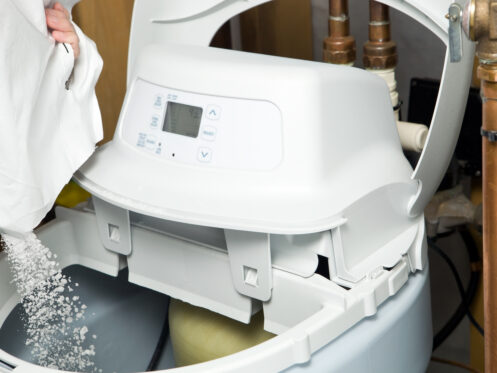Water softener systems have become integral to many households, contributing to cleaner dishes, softer clothes, and longer-lasting appliances. However, owning and maintaining these systems can bring up several questions and concerns. We’ve created this guide to explain and answer the most common questions about home water softener systems so that you can make an informed decision.
1. What Is a Water Softener System?
A water softener system is equipment that decreases or reduces the content of calcium salts, magnesium, and other minerals found in hard water. Some of these minerals may result in scaling in your pipelines and various equipment at home or cause dryness to your hair and skin, as well as leave spots on dishes, mirrors, and glasses. A water softener system works by swapping these hard minerals for sodium or potassium ions through a process known as ion exchange, leaving you with softer water.
2. How Does a Water Softener System Work?
A water softener system starts the process when hard water flows from the primary water source into the system’s mineral tank. The tank is filled with small polystyrene beads, also known as resin beads, with a negative charge. These resin beads are coated with positively charged sodium or potassium ions.
As the hard water passes through the mineral tank, the calcium and magnesium ions in the water, which carry a positive charge, are attracted to the negative charge of the resin beads. This attraction results in an ion exchange process, replacing the hard ions with the soft ions from the beads. After this process, the now-softened water is ready for use around your home.
Over time, as the resin beads exhaust their supply of soft ions, the system begins a regeneration process. A strong brine solution is flushed through the tank to recharge the beads with fresh sodium or potassium ions, preparing the system to soften more incoming hard water.
3. What Are the Benefits of Using a Water Softener System?
Using a water softener system offers several benefits to homeowners. Firstly, it significantly reduces the scaling caused by minerals in hard water. This build-up can lead to clogs and reduce the efficiency of your pipes and appliances, leading to expensive repairs or replacements.
Soft water is also good for your appliances, contributing greatly to their life span. Deposition of minerals in hard water occurs gradually and may lead to the destruction or shortening of the life span of such appliances as water heaters, dishwashers, and washing machines. Water softeners make it easy to eliminate such minerals, which improves the efficiency and durability of your appliances, thus saving you money.
Also, the soft water is kinder to one’s skin and hair. Hard water contains various minerals that may dry your skin while making your hair appear dull. However, soft water is gentle on your body by maintaining the natural oil in your skin, leading to softer feeling and shiny-looking skin and hair.
Water softener systems can also prove beneficial for your laundry. Clothes washed in hard water often look dull. Soft water can make your clothes feel softer, look brighter, and last longer. Moreover, soft water makes other cleaning tasks easier, too. Whether you’re washing dishes or cleaning the bathroom, soap reacts more efficiently with soft water, creating a richer lather which results in cleaner, spot-free dishes and less soap scum in your bathroom.
Finally, a water softener can lead to cost savings over time. While there’s an upfront cost to install a water softener system, the savings in reduced appliance repairs, less use of cleaning products, and longer-lasting clothing can outweigh the initial investment.
4. How Often Should a Water Softener System Be Regenerated?
The frequency of regeneration depends on your system’s size, the water’s hardness, and your household’s water usage. Generally, most homes require regeneration once every week or two weeks. However, some systems have electronic sensors that automatically detect when the resin beads are exhausted and initiate a regeneration process.
5. How Do I Maintain My Water Softener System?
Maintaining your water softener system is crucial to ensure its longevity and optimal performance. Regular maintenance begins with monitoring the salt levels in the brine tank. Checking it monthly and replenishing salt as necessary are good practices. Use a high-purity salt that contains low insoluble impurities to prevent build-up.
Additionally, clean the brine tank yearly to remove salt build-up and sediment. The system’s settings should be periodically updated for changes in water hardness or household water usage. Some systems also require periodic resin bed cleaning, which involves flushing a specially formulated cleaner down the brine tank.
Lastly, consider professional plumbing servicing every few years for a detailed inspection and tune-up. These steps will ensure your system functions efficiently, providing high-quality soft water for your household needs. For residents of Sacramento, CA, and the surrounding areas, Huft Home Services provides reliable water softener system installation and maintenance services.
6. How Do I Choose the Right Water Softener System?
Many factors determine the size of water softeners. For example, you will need to consider the hardness of your water, average daily household water consumption, and your water supply’s flow rates.
First, you’ll need to test your water’s hardness. You may use a water test kit or inquire at your local water company to confirm. The hardness of water is measured as grains per gallon (GPG). High GPG makes your water harder, with a bigger need for a water softener. Then, you will need to determine the average daily water consumption in your household. It is commonly expressed as gallons per day (GPD).
Divide your water usage to determine how many gallons per day (GPD) you use. This will provide you with the figure of grain a day, which is the capacity your water softener must have to successfully soften your water daily.
Finally, consider how much water passes through your house, as it is typically expressed in gallons per minute (GPM). A smaller water softener might not manage the peak water flow rate through the system, and you would end up with hard water in your residence. You should also ensure that it is not oversized so you don’t use excessive salt and water in regeneration.
A water softener system is an investment that can significantly enhance your home’s water quality, benefiting your skin, hair, appliances, and chores. While the system requires regular maintenance and may have potential drawbacks to those on a sodium-restricted diet, the advantages of soft water, in most cases, outweigh these concerns. A properly maintained and serviced water softener system will save on costs in the long run while ensuring you enjoy a better lifestyle.
Do you want better quality water and a better life at home? At Huft Home Services, we offer more than just water-softening solutions. Our skilled team also provides comprehensive services for heating, cooling, and electrical systems. Trust us to keep your home comfortable, with soft water and appliances running efficiently. Don’t wait; contact us now for a consultation, and let us make your home the best it can be.




